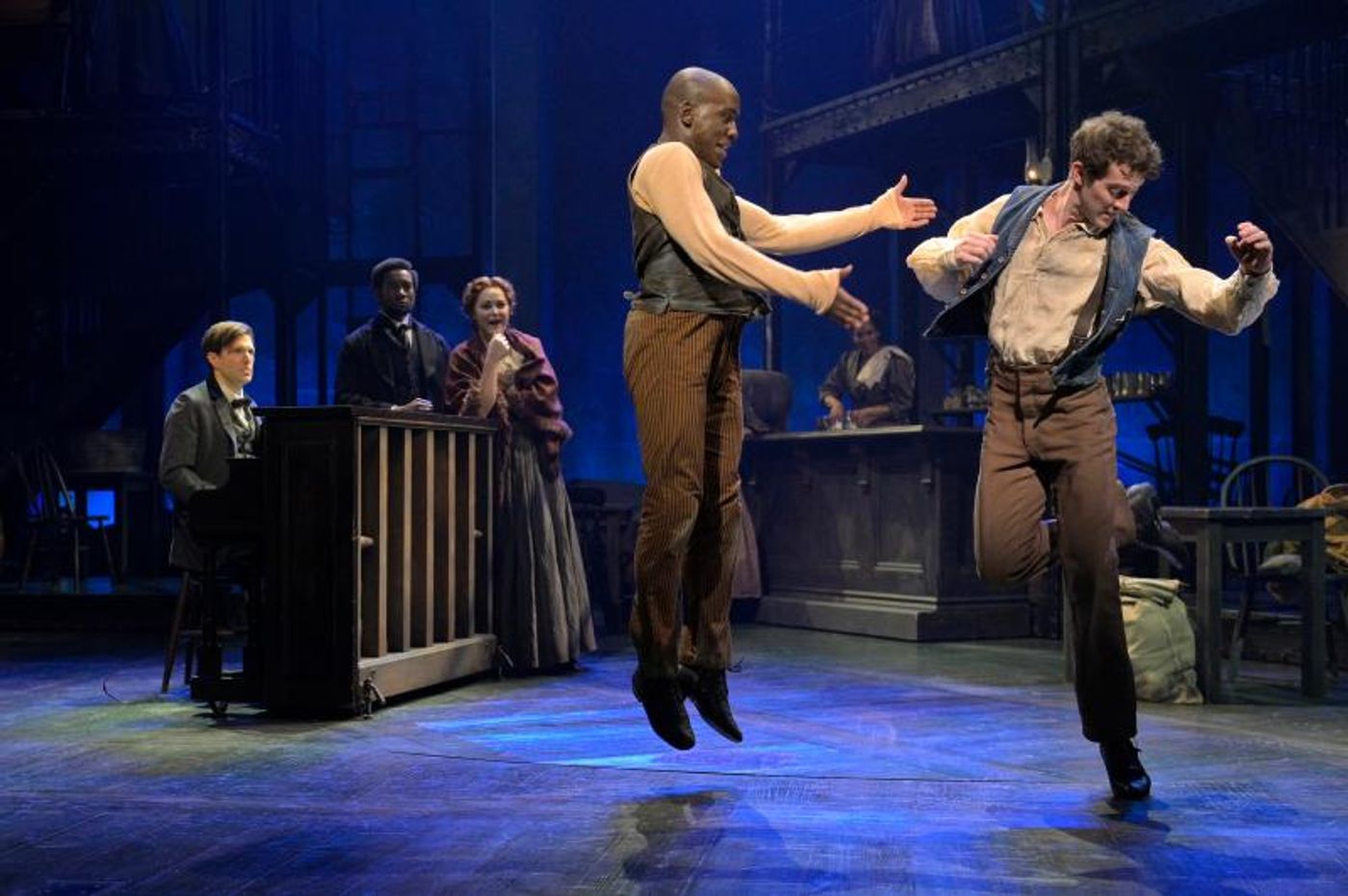Review: PARADISE SQUARE at Berkeley Repertory Theatre is almost that.

Paradise Square, the world premiere now at Berkeley Repertory Theatre, is a glorious if frustrating addition to the musical theatre canon, blessed with an exceptional cast, a stirring score, and the unbelievably exquisite choreography of Bill T. Jones. Yet, despite these riches, the opulent production trips self-consciously on its own ambition, with the whole adding up to something less satisfying than the sum of its exceptional parts.
Mostly, the story - and there's a lot of it in the book by talented troika of Marcus Gardley (And Jesus Moonwalks the Mississippi), Craig Lucas (Prelude to a Kiss, Amélie), and Larry Kirwan (front man of the New York-based Irish rock band Black 47) - overwhelms the evening.
Like an urban Camelot, for a brief and shining moment in the late 1800s, there was a patch of lower New York City called Five Points where the color of your skin, the land of your birth, and other potentially divisive elements seemingly did not matter much.
There, Nelly, a free black woman from New Orleans, loves Willie O'Brien, an Irish immigrant bar owner heading off to the Civil War. She and his sister Annie will run the bar in his absence. Annie also works on the Underground Railroad, helping slaves escape to the North, along with her husband, Rev. Cornish, a former slave. William Henry, one of their "passengers" loses track of his girlfriend, Angelina Baker, and insists on waiting until he finds her before moving on. He's forced to keep a low profile by sharing a room above the bar with Owen, Annie's brother, newly arrived from Ireland. The two young men dance for bar patrons to earn money, but their skill and success threatens to draw unwanted attention to William Henry's runaway status and Owen's potential obligation to be drafted into the Union army, a requirement for Irish immigrants, but blacks need not apply. The draft, however, can be avoided by anyone who pays a $300 fee, so the rich folks uptown, at the opposite end of the income disparity continuum from Five Points, are unconcerned that the largely Irish immigrant dock-worker labor union members cannot afford this option because they are on strike for better conditions and becoming increasingly angry that their jobs are being filled by "scab" black migrant workers from the South.
Those are just some of the themes Paradise Square attempts to tackle.
There's also an alcoholic artist in creative crisis, composer Stephen Foster, who shuns his past "plantation song" successes and abandons his family, stumbling into Annie and Nelly's bar desperate to find work, even under an assumed name, because Nelly announces early on that she despises what that Stephen Foster's songs represent.
Need more plot? Stick around.
It's an embarrassment of storyline riches and all of them are worthwhile subjects for dramatic development, drawn from history and achingly relevant today. The failing is that every one of these arcs is presented almost reverently, as a very important story to which attention must be paid, so the drama frequently gives way to a feeling of being lectured, or worse, exhaustion rather than empathy.
Director Moisés Kaufman, fresh from the revival of Torch Song on Broadway, and the many authors will do well to make hard decisions to trim that which is not fat, per se, but non-essential to core narrative advancement like the scenes and a quite good song between Foster and his estranged wife Janey. It's a lovely, smartly-contrived moment that brings in one of Foster's most popular melodies, but it's not needed here. They also need to find an ending and jettison the PowerPoint caption summaries used to try and wrap things up.
The score, "based on the songs of Stephen Forster," by Kirwan and Jason Howland with lyrics by Nathan Tysen, serves the various threads well, with soaring ballads, epic Les Miserables-style set pieces, rousing anthems, and beautifully intimate character profiles. It also expertly interweaves Irish step and African juba themes as a platform for Jones to make vigorous magic that is as theatrically fresh and exciting today as the work of Jerome Robbins must have seemed when West Side Story debuted sixty years ago.
As long as this riveting cast keeps singing and dancing, ensconced in jaw-dropping, dexterously changeable world created by scenic designer Allen Moyer and lighting designer Donald Holder, the production is enthralling. The thirty-strong company is a true ensemble, but several of the principals - the gravity-defying Sidney Dupont (William Henry) and AJ Shively (Owen), the beleaguered Jacob Fishel (Foster), the indefatigable Madeline Trumble (Annie), and the luminous and vibrant Christina Sajous (Nelly) - deserve an extra bow.
Berkeley Repertory Theatre is to be lauded and applauded for continuing its long-standing commitment to developing new musicals like the recent Amélie, Monsoon Wedding, and Ain't Too Proud. Let's hope that the creative team responsible for Paradise Square can regroup and find solutions to making this incredible undertaking a truly unqualified hit.

Sidney Dupont, and A.J. Shively in Paradise Square
Paradise Square runs through February 24, 2019
Berkeley Repertory Theatre, 2015 Addison St, Berkeley CA
Tickets: berkeleyrep.org or 510.647.2949
Photos: Kevin Berne
Reader Reviews

Videos

